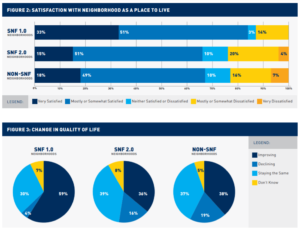Detroit’s Strategic Neighborhood Fund: A Baseline Report of Resident Perceptions
Download PDF of the full policy brief
By Lydia Wileden and Afton Branche-Wilson
Introduction
The Detroit Metro Area Communities Study (DMACS) is a University of Michigan initiative designed to regularly survey Detroit residents about their perceptions of neighborhood conditions, economic opportunity, local priorities, and overall quality of life. Since 2016, DMACS has conducted citywide surveys on topics including crime and policing, community health, housing and blight, entrepreneurship, and the impacts of the COVID-19 pandemic.
In fall 2019, DMACS deployed a survey focused, in part, on capturing baseline data to measure the impact of Detroit’s Strategic Neighborhood Fund (SNF) initiative. The SNF initiative is an effort by the city and its nonprofit and private sector partners to stabilize neighborhoods and attract new residents through projects aimed at boosting economic opportunity and improving quality of life. The city and its partners selected 10 Detroit neighborhoods—all outside of greater downtown—for the SNF program based on their likelihood to quickly benefit from localized investment as measured by their population densities, the presence of a central commercial corridor, strong local leadership, and proximity to public assets. Announced in 2014 and formally launched in 2016, the first round of SNF investments targeted improvements in the Southwest/Vernor, Livernois-McNichols, and Islandview/Villages neighborhoods (referred to here as SNF 1.0 neighborhoods). In 2018, the second round of SNF investments was announced for seven additional neighborhoods: Northwest/Grand River, Warrendale/Cody Rouge, Russell Woods/Nardin Park, Campau/Banglatown, Jefferson Chalmers, East Warren/Cadieux, and Gratiot/7 Mile (referred to here as SNF 2.0 neighborhoods). This report draws on fall 2019 DMACS data to offer a snapshot of neighborhood conditions and resident perceptions at the early stages of the SNF program. Deployed as initial investments were coming to fruition in SNF 1.0 neighborhoods and prior to much of the planned development in SNF 2.0 neighborhoods, the survey captures the perspectives of 1,855 Detroit residents, including an oversample of those living in SNF communities. The data have been weighted to reflect city demographics. The resulting data enable comparisons between SNF and non-SNF resident perspectives as well as between SNF 1.0, SNF 2.0, and other Detroit residents.
By highlighting these differences in resident sentiments early in the SNF initiative, this report provides a baseline against which to measure the impact of forthcoming investments in parks, streetscapes, commercial corridors, and housing as well as neighborhood-level feedback on how the city can most effectively and equitably plan for continued economic development in these neighborhoods and across Detroit. Additionally, we highlight suggestive findings on how initial investments in SNF 1.0 neighborhoods may be impacting residents’ perceptions of their neighborhood and offer neighborhood level feedback on how the city can most effectively and equitably plan for continued economic development in these neighborhoods and across Detroit.
Key Findings
- Residents of the first three SNF neighborhoods (SNF 1.0)—where strategic investment started in 2016—are significantly more likely to report greater overall neighborhood satisfaction and improvements to neighborhood quality of life than other Detroiters. SNF 1.0 residents are also more likely to be satisfied with housing conditions and the availability of neighborhood parks and stores.
- These same SNF 1.0 neighborhoods have seen more positive signs of neighborhood change— more people moving in, more businesses opening, increasing property values, and increasing neighborhood attractiveness—than other neighborhoods in the city.
- Despite these reported improvements, residents of SNF 1.0 neighborhoods are no more likely than residents in the rest of the city to express fears over being displaced due to rising housing costs.
- Perceptions of safety are stronger in SNF 1.0 neighborhoods than other Detroit neighborhoods. SNF 1.0 residents are also more likely to sense their neighborhoods are growing safer, though they remain dissatisfied with the amount of local crime.
- In the second set of SNF neighborhoods (SNF 2.0)—where strategic investments are only in the planning stage— perceived changes in quality of life closely match the rest of the city. Comparing SNF 2.0 and non-SNF areas going forward can help demonstrate how SNF investments may impact resident perceptions over time.
- On many measures of neighborhood quality, residents of the 10 SNF neighborhoods do not express greater satisfaction with neighborhood amenities than other Detroit residents, despite their neighborhoods being chosen for SNF in part based on preexisting local assets. These baseline similarities suggest that future comparisons in resident perceptions between SNF and non-SNF neighborhoods may offer evidence of the effectiveness of the SNF strategy

Comparing Detroit residents’ perceptions in areas of investment through the Strategic Neighborhood Fund, according to Detroit Metro Area Communities Study survey results from fall 2019.
